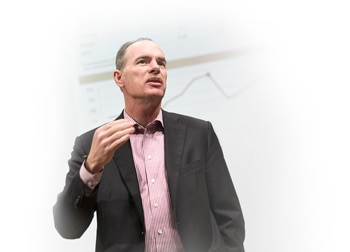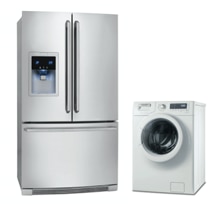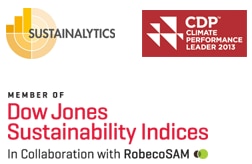Inclusive approach
Electrolux builds on the insights of others to gain better understanding of its consumers, its impacts and how it can better respond to emerging issues.
In 2013 Electrolux continued to reach out and learn from others.
Among these activities, the company hosted industry peer and supplier discussions on emerging issues, dialoged with union representatives and government officials and sought input from consumers and employees on sustainability priorities. Electrolux uses this knowledge to build a stronger strategy and more transparent company. This feedback is reported to Group Management and incorporated into decision-making.
Click on the following categories to review some examples of the Group’s inclusive approach.
Consumer perception
| Consumer insight helps shape the business strategy and product development. Brand scorecards, trend reports, independent analysis as well as interviews and visits to households around the world keep the Group abreast of consumer behavior. For the first time, the Electrolux brand scorecard included a module to measure consumer awareness of sustainability in purchasing decisions. As part of a wider brand scorecard study, a total of 3,600 consumers were interviewed in Australia, Brazil, China, Germany, France and the United States. The results confirmed that the Group’s priorities on appliance efficiency are shared by consumers across markets. |
|---|
The value chain approach
| Electrolux is committed to working in partnership along the value chain to develop sustainable solutions. The company hosted supplier workshops in all regions deemed high risk for non-compliance to the Code of Conduct, to reinforce energy efficiency, high labor standards and Group sustainability priorities. A total of 194 participants representing 127 suppliers--13% of high-risk suppliers--were trained during the year, including in Egypt and an energy workshop in China. Retailers increasingly stipulate formal commitments to social and environmental performance standards in their contracts. They also periodically request Code of Conduct audits of Electrolux facilities. In 2013, several major retailers requested Code of Conduct audits of Electrolux facilities and contracted manufacturers (OEM) suppliers. |
|---|
Employee input
| Employee contributions are highly valued. The Group's Board of Directors comprises non-executive members, the CEO and, in accordance with Swedish law, three employee representatives and three deputies who provide input into company decision-making. The bi-annual Employee Engagement Survey (EES) is designed to measure corporate culture, team efficiency, employee engagement and leadership. The survey is scheduled again for 2014, including for the first time employees across production and non-production. In 2013, the EES was conducted on a smaller scale, and included a pilot to gauge feedback from four factories, some benchmarking teams and follow-ups with constituents with low scores in 2012. The results in 2013 show good engagement from the surveyed population with a response rate of 87% and overall significant improvements and fewer low-scoring teams. Introduced in 2012, the Purpose program contributes to sustainability objectives by engaging employees. The program aims to build an understanding of the value Electrolux creates beyond financial and market objectives. Over 2,400 employees across the company participated in Purpose workshops in 2013. In 2014, comments were sought from top 150 managers across the company on the Group’s sustainability work and priorities. With a response rate of 58%, feedback indicated that:
|
|---|
Building relationships with unions
| To be launched in 2014, a new Group Industrial Relations strategy underlines the importance of cohesive and inclusive relationships with union representatives. Since signing the International Framework Agreement (IFA) with unions in 2010, meetings have been arranged on an annual and as needs basis with employee representatives to review the Group’s Workplace Code of Conduct compliance and fulfillment of the IFA. Additionally, meetings take place with the head of Industrial Relations and union representatives before each Board of Directors meeting. |
|---|
Shareholder priorites and rating agencies
| Electrolux maintains ongoing dialog with investors and owners, many of whom are pension funds with long-term commitments to Electrolux. Their primary concern is transparency over long- and short-term risks and opportunities affecting the business. The Group strives to meet the information needs of socially responsible investors (SRI) through its reporting activities. For example, Electrolux participates in the Dow Jones Sustainability Index, and is ranked as industry leader in the Household Durables sector. During the year, investor priority areas included labor relations, climate change and anti-corruption. Electrolux reports to the CDP. In 2013, Electrolux was recognized by CDP as one of five leading Nordic companies for actions taken to reduce carbon emissions. Electrolux was also ranked as a leader in climate change data disclosure. Electrolux held meetings with a number of investors to update them on the status of labor management in Thailand. |
|---|
Shared agenda
| Sustainability Affairs is responsible for Group dialog with internal and external stakeholders on sustainability-related issues. The Group cooperates with other corporations sharing similar goals through, e.g., the UN Global Compact (UNGC) and its Nordic network, as well as the national industry organization Confederation of Swedish Enterprise. Electrolux is also a member of the think-tank organization Business for Social Responsibility (BSR), and the International Council of Swedish Industry. In 2013 Electrolux joined the Trans Atlantic Business Council (TABC), which supports a trade agreement between the EU and US. The frequency of engagement is issue- and agenda-driven. Dialog on human rights, for example, continued through involvement with UNICEF’s Corporate Network for Children’s Rights, and the Swedish Network for Business and Human Rights. Electrolux hosted seminars with experts and peer companies on conflict minerals, whistleblowing and grievance mechanisms to share learning and improve implementation of new legislation and international standards. |
|---|
Endorsing initiatives
| Over and above its support of the UNGC's ten principles, Electrolux endorses initiatives such as Caring for Climate, aimed at advancing practical solutions and shaping public policy and public attitudes on climate change. Electrolux is a signatory of the UNGC CEO Water Mandate, a public-private initiative to assist companies in the development, implementation and disclosure of water policies and practices. |
|---|
Dialog with goverments
| Electrolux maintains dialog with opinion-formers and policymakers from governments and intergovernmental organizations. This is conducted directly, and through membership in appliance industry associations such as the European Association of Household Appliance Manufacturers (CECED) and the American Home Appliance Manufacturers Association (AHAM). Harmonization of product performance standards is a key topic among national and international bodies such as the International Electro technical Commission and CECED. Public-policy discussions with government authorities cover issues such as climate change, energy efficiency, resource efficiency, phasing out of chemicals of concern and substances of high global warming potential, producer responsibility for recycling and smart appliances. Electrolux was an active supporter of an upcoming European Commission proposal for energy labels on vacuum cleaners sold in the EU. Electrolux has also been a contributor to the High Level Group on Innovation Policy Management, an EU initiative to introduce an EU policy on how to rethink and improve innovation for job creation and greater sustainability. Jan Brockmann, Electrolux Chief Technology Officer is a member of the Group. In Australia, Electrolux is working with government on new Minimum Efficiency Performance Standards for 2015, and collaborating with government technical consultants to ensure levels are consistent with industry best practice. |
|---|
Locally driven engagement
| Each market and business area is responsible for maintaining dialog with representatives from relevant interest groups. Local operations and engage with non-governmental organizations including the Ovarian Cancer Research Fund, Save the Children and the United Way, the Philippine partner Sagip Kapamilya and Joy for Life (Livslust) in Sweden. Electrolux partnered with Global Green USA, an environmental non-profit organization and affiliate of Green Cross International, to launch an app across all major markets aimed at raising individuals’ awareness on their water consumption levels. |
|---|
Stakeholder-engagement platform
| Year on year, Electrolux seeks to improve its stakeholder engagement. In 2014, priority focus areas will be roll-out of the revised Code of Conduct across the Group and among suppliers, the carbon target (particularly internal engagement] and implementation of the UN Guiding Principles. |
|---|
CEO Statement

In 2013 we continued to deliver above our growth target and delivered 4.5% in organic sales growth.
CEO Statement

I'm convinced that raising product efficiency for the growing middle class is where long-term shareholder value creation lies.
Our products

Electrolux is the only appliance manufacturer in the industry to offer complete solutions for both consumers and professionals. The focus is on innovative and energy-efficient products in the premium segments.
Sustainability
Achieving the Group's vision of sustainability leadership is crucial to realizing the business strategy. The objective is to develop smarter, more accessible, resource-efficient solutions that meet people's needs and improve their lives. Read the comprehensive sustainability performance review.
Awards & recognition

Financial Reporting
Net sales for the Electrolux Group in 2013 amounted to SEK 109,151m, as against SEK 109,994m in the previous year. The organic sales growth was 4.5%, while currencies had an impact of -5.3%.
